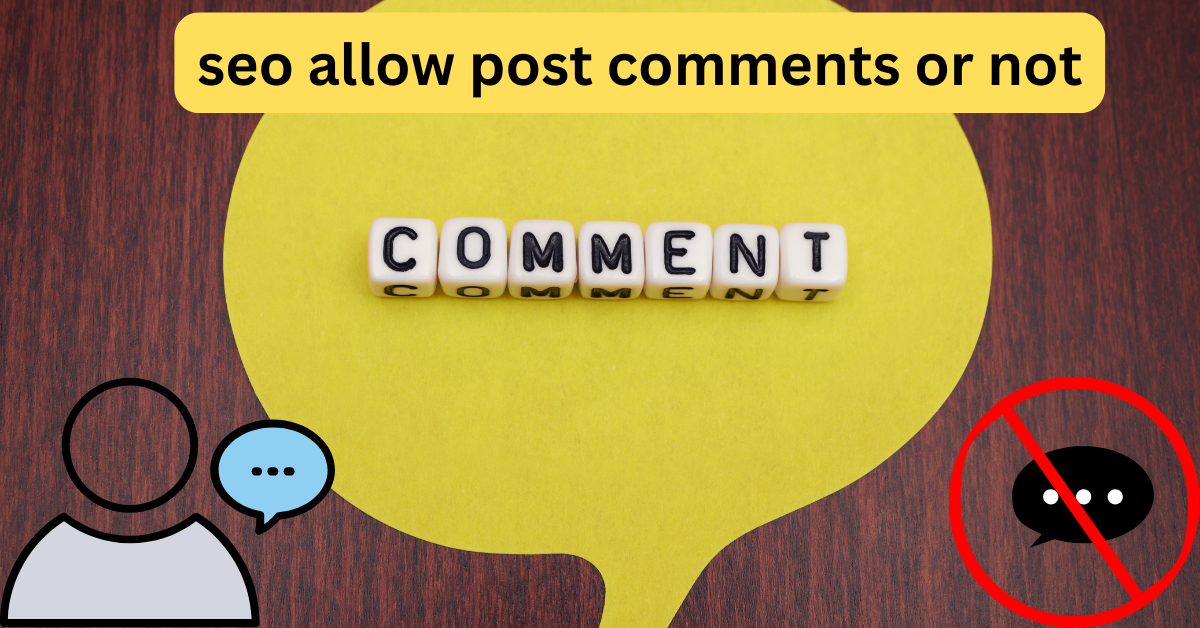Introduction
If you run a blog or internet site, you’ve probably wondered: SEO Allow Post Comments or Not? It’s an essential selection that impacts each consumer’s engagement and search engine ratings. While a few believe that remarks beautify search engine optimization by adding clean content and increasing interactions, others argue they bring about unsolicited mail and reproduction content problems.
In this newsletter, we’ll discover whether or not you need to allow published comments, how they have an impact on search engine marketing, and exceptional practices for managing them.
Do Comments Improve SEO?
The short solution? Yes, however, best if managed efficaciously. Here’s how:
1. Boosts User Engagement
Comments encourage discussions, making your content material more enticing. Google rewards pages with high engagement, as it indicates precious content. If traffic interacts, stays longer, and makes contributions to discussions, your dwell time increases, which may additionally improve your scores.
2. Provides Fresh Content
Every new remark provides a particular text on your page. Search engines love clean content, that can assist your web page live relevant longer. Regularly up-to-date pages are listed more often through Google.
3. Increases Keyword Diversity
User-generated remarks introduce long-tail keywords that you might not have protected to your authentic article. This can help your page rank for a broader variety of search queries.
4. Encourages Social Proof & Credibility
A nicely moderated remark section builds agreement. If readers see others discussing your content material, they’re more likely to peer your web page as authoritative and credible.
Which Technique Should Be Avoided in SEO?
If you decide to permit feedback, be aware of SEO errors that would damage your scores.
1. Allowing Spam Comments
Spam feedback with beside-the-point links can lead to penalties from Google. Avoid comments that contain:
- Fake profiles selling merchandise
- Unrelated content
- Excessive self-merchandising
👉 Solution: Use anti-unsolicited mail plugins like Akismet or enable guide moderation.
2. Publishing Low-Quality Comments
If your remark segment is packed with low-cost, familiar responses (e.g., “Great submit!”), it could make your page seem much less authoritative.
👉 Solution: Set commenting tips and encourage meaningful discussions.
three. Allowing Duplicate Content
Some customers may replica-paste content from other websites into your feedback. Duplicate content material can harm your ratings.
👉 Solution: Use canonical tags to save you duplicate content troubles.
four. Neglecting Comment Moderation
An unmoderated feedback section can grow to be a toxic environment, discouraging users from attractive.
👉 Solution: Set clear guidelines and moderate discussions actively.

Should I Allow Comments on My Blog Posts?
The answer depends on your niche, dreams, and moderation ability.
1. Allow Comments If:
✅ Your target audience is exceedingly engaged and enjoys discussions. ✅ You have time to mild remarks well. ✅ You use a robust junk mail filter. ✅ Your content material blessings from person-generated insights.
2. Disable Comments If:
❌ Your blog draws a whole lot of unsolicited mail. ❌ You don’t have the resources to moderate them. ❌ Your content material doesn’t require discussions (e.g., news articles).
👉 Alternative: Use social media for engagement rather. Platforms like Twitter and Reddit allow discussions without the SEO dangers.
Do Comments Count as Backlinks?
Many accept as true that comments can offer backlinks that enhance search engine marketing. However, that is now not completely actual.
1. NoFollow vs. DoFollow Links
Most blogs set comment links to NoFollow, meaning they don’t pass search engine optimization costs. Google doesn’t count those hyperlinks while ranking websites.
👉 Solution: If you need one-way links, cognizance of guest blogging or outreach strategies as a substitute.
2. Comment Backlink Spam
If customers upload spammy links in feedback, it could damage your site’s reputation. Google’s Penguin set of rules specifically goals for unnatural link-constructing practices.
👉 Solution: Use computerized junk mail detection and manually approve valid hyperlinks.
Best Practices for Managing Comments
If you decide to allow comments, comply with these steps to maximize search engine optimization blessings while fending off risks:
1. Use a Comment Moderation System
- Enable guide approval earlier than publishing.
- Use Disqus or WordPress local feedback with moderation settings.
2. Set Commenting Guidelines
- Ask customers to stay on the subject matter.
- Discourage promotional hyperlinks.
- Require actual names as opposed to anonymous money owed.
three. Implement Anti-Spam Plugins
- Use Akismet for WordPress.
- Enable recapcha to dam bots.
4. Engage With Your Audience
- Reply to precious remarks to inspire dialogue.
- Delete or hide offensive or beside-the-point remarks.

Alternatives to Comments for SEO
If you’re unsure about permitting feedback, strive these options to enhance engagement:
1. Social Media Discussions
Instead of remarks, inspire customers to talk about your content material on social media. Platforms like Facebook and LinkedIn provide better moderation tools.
2. Q&A Sections
If your blog covers technical subjects, a Q&A phase can help consciousness discussions on relevant questions.
3. Contact Forms & Surveys
Use touch forms to accumulate remarks without the search engine marketing dangers of spammy feedback.
Final Verdict: SEO Allow Post Comments or Not?
So, should your SEO Allow Post Comments or Not longer? The answer relies upon your website’s desires. Well-moderated feedback can increase search engine marketing, upload fresh content, and encourage engagement. However, unsolicited mail, low-first-class responses, and duplicate content material can harm your scores.
Key Takeaways:
✔ Allow comments if you may slight correctly. ✔ Use anti-junk mail gear and set clear hints. ✔ Consider alternatives like social media or Q&A sections.
If managed successfully, remarks may be an effective tool for search engine optimization success. However, if left un moderated, they can do more damage than desirable. Choose accurately and optimize your strategy accordingly!
Allowing comments on your posts can also help boost your local SEO efforts, as engaging with your audience shows search engines that your content is relevant and actively discussed, which is a great addition to any Local SEO White Label strategy.


Howdy! Would you mind if I share your blog with my twitter
group? There’s a lot of folks that I think would really
enjoy your content. Please let me know. Thank you
Yes why not .